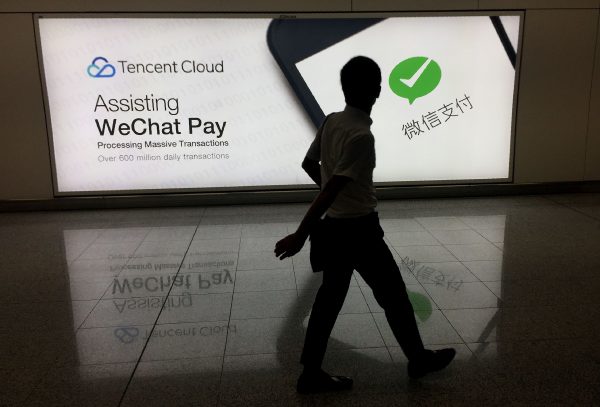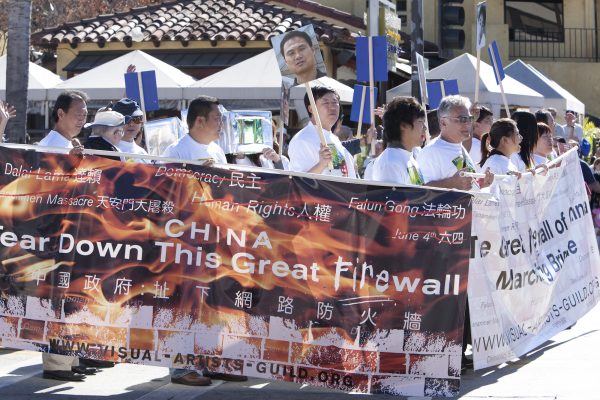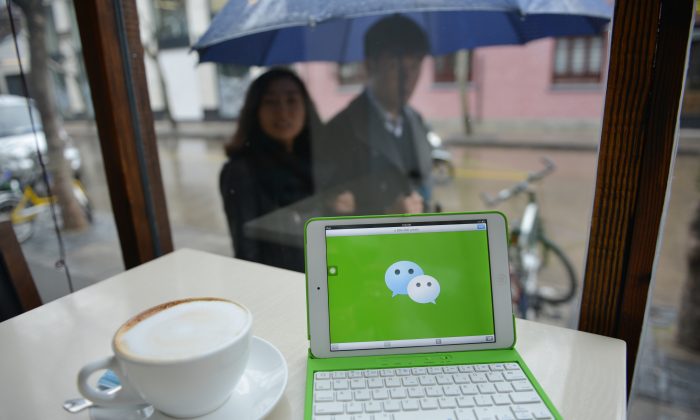By Mary Hong
March 27, 2023 Updated:
March 27, 2023
The logo of Chinese
instant messaging platform WeChat is shown on a mobile device in Shanghai,
China, on March 12, 2014. (Peter Parks/AFP/Getty Images)
While the world is
awakening to the threat of TikTok, WeChat is another Chinese social media
platform that is infiltrating and monitoring a huge population of Chinese
people overseas.
Lydia Liu is a Chinese
American who found herself becoming a victim of the Chinese Communist Party’s
(CCP) censorship through WeChat, a Chinese-owned social media video-sharing
app.
She founded the MoshangUSA account as a source of news
and commentary about life in America for Chinese Americans. She had been
careful about the CCP’s so-called “red line,” and the official account she
registered on WeChat only covered issues related to America.
When WeChat banned her
official account, she felt the CCP had deprived her of her rights as an
American to speak freely about American affairs. “The CCP’s long arm has
stretched way too far,” she told The Epoch Times on March 21.
A
Complex of Social Control
WeChat’s application
covers almost every aspect of Chinese daily life online, with features from
text messaging and video conferencing to making calls, paying bills, making
bookings, sharing photos and videos online, and disseminating news. However,
the app is not exactly a haven for free speech or political debate.
Zhang Junjie, a history
major at Mt. San Antonio College in California, is a WeChat user. He said that
the app is the only way for him to communicate with people inside China.
“Because they cannot use foreign software such as Facebook and Line, so I can
only use WeChat,” he told the Chinese-language edition of The Epoch Times on
March 20.
By excluding foreign
players such as Twitter, Facebook, WhatsApp, Instagram, and PayPal from the
Chinese market, the CCP has exploited WeChat—a complex amalgamation of the
above-mentioned apps’ features—as a powerful tool for social control. The app
dictates what users see, what they say, and even their purchasing power in the
Chinese-speaking world.
Zhong Shan, a Silicon
Valley engineer, said that technically, WeChat is a highly capable tool for
controlling information. After conducting his own tests, he said that “WeChat’s
monitoring may have covered all the keywords in the past 12 years. That is to
say, WeChat has blocked all adverse keywords associated with Chinese societal
events since 2010.”
WeChat tracks, analyzes,
and censors users, as well as handing data over to the communist regime. This
is because it is regulated by the Chinese Communist Party (CCP), with
algorithms tweaked to advance the Party’s anti-American narrative. It censors
any information to the contrary, and spreads the CCP’s ideology globally—and
injects it directly into the lives of overseas Chinese, in particular.

CCP’s
Global Censorship System
The WeChat
multi-functional social media app had more than 1.3 billion monthly active users as of
the end of 2022. That implies that most Chinese people’s families, relatives,
friends, and co-workers are all users.
Many overseas
Chinese—students, immigrants, and first-generation overseas Chinese—rely on the
China-based WeChat as their source of information, as well as to stay in touch
with their friends and family in China.
In a 2018 survey on how much influence the
regime wields on the Mandarin-speaking community in Australia, 60 percent of
survey participants identified WeChat as their primary source of news and
information. Only 21 percent sourced news directly from media outlets’ own
websites.
Zhong Shan said that
there are relatively few overseas Chinese who are truly tech-savvy, highly
educated, and skilled in English. He said, “In my Chinese-speaking circles,
English is not the tool for accessing information for the majority of them.
They can’t live without WeChat’s official account. There’s also a high
proportion of mainlanders in Taiwan using WeChat.”
WeChat has established a
Chinese information ecosystem for Beijing’s propaganda and censorship machine
to gain a foothold in the overseas Chinese community. Inexorably, many overseas
Chinese have formed viewpoints similar to the regime’s proffered view, and many
WeChat users are likely to unconsciously exercise self-censorship to avoid the
wrath of the app’s censorship and surveillance capabilities.
Zhang Junjie is all too
familiar with WeChat’s censorship. He said anyone who expresses or shares
opinions on Chinese politics or other hot topics—such as China’s social
issues—will experience it. “Especially for those who are in current affairs
groups with a large number of participants,” Zhang said.
WeChat adopted a “One
App, Two Systems” policy that allows the company to treat
its domestic and international users differently, as indicated by research
carried out in 2016 by the Citizen Lab at the Munk School of Global Affairs
& Public Policy at the University of Toronto.
However, since the 2019
Hong Kong anti-extradition movement, overseas users have experienced similar
censorship, as well as account shut-down policies just like those suffered by
mainland users.
A 2019 report showed how
China’s Communist Party exerts its influence to censor people in the United
States through WeChat.
According to technology
website The Verge, Bin Xie, an information security analyst at Texas
Children’s Hospital, had his account shut down after he wrote “The
pro-China candidates totally lost” in reference to pro-democracy protests in
Hong Kong in 2019.
Zhang Junjie echoed the
experience reported by Bin Xie. He said, “During Hong Kong’s democratic
movement in 2019, WeChat went wild with its censorship. I was banned three
times: first it was for my opposition to the Chinese Foreign Ministry’s
remarks, while the second and third were due to my sharing of sensitive
content.”
His sharing of the White Paper movement in Shanghai was
censored by the App’s message filtering technology, and no one could see it. He
also shared a short film about the movement, but the film was gone from his
account in an hour.
Zhang tried several times
to share a video of how Hu
Jintao was removed during the CCP’s 20th national meeting, but
none of his contacts could see it. “You can see that WeChat censorship is very
strict on the content of this video,” said Zhang.
MoshangUSA founder Lydia
Liu also had her public account shut down in October 2022, when WeChat disabled
hundreds of thousands of accounts during the Sitong Bridge protest, which took place in Beijing in
October, 2022. She said, “I neither liked nor commented, but my account was
also blocked that day.”

WeChat’s
Dual Censorship
The most common way
WeChat censors overseas users is to hide their content without their knowledge.
The users do not know their content has been censored unless they test it
themselves.
Aaron Chang, a Chinese
student at Sydney University in Australia, said that he’s experienced how his
friends inside China won’t be able to see his sensitive comments until a few
days later—after the sensitive content is removed. “However, I have been able
to see the content myself,” he said.
Zhang Junjie explained
that WeChat’s sensorship is very specific and accurate. His friends inside
China sometimes won’t see his comment, while those with an overseas account can
still see his comment. “That shows that the censorship of the chat group has
been specifically aimed at domestic users,” he said.
Lydia Liu said it is a
kind of “shadow banning,” meaning that in theory, foreign users can see the
posts, but domestic users cannot. However, Liu said she no longer sees any
difference in WeChat’s censorship of Chinese users abroad compared to that
imposed on its users within China.
Mr. Chen is a WeChat user
in San Francisco. He described the censorship as even more insidious than
simply deleting posts. “When the posts are deleted, we’ll seek different ways
of expression,” he said. “But this invisible practice has stopped us from
making adjustments and made our efforts completely useless.”
When the CCP imposed its
lockdowns during the pandemic, Chen was in China. His post describing the
inhumane lockdown was blocked from his friends’ WeChat accounts, and he was the
only one who could see it. He tried to take a screenshot of the word document,
but it was blocked again. He then took a picture of a handwritten message, but
it still didn’t work.
After he returned to the
United States, he found himself on WeChat’s monitoring list. He can no longer
send out any comments on politics—not even using humor or innuendo.
WeChat has become an
information firewall that only allows a unidirectional information flow.
It gives domestically censored information free access to the outside world,
but blocks outside information from coming in. In this sense, it facilitates
the CCP’s censorship of the world.
Anti-American
Algorithm
Lydia Liu had her first
post blocked during the last Olympics Games. WeChat disabled her account for
two weeks because of her comment about the U.S. team winning more gold medals
than the Chinese.
Another of her
articles—encouraging others not to panic about the COVID-19 pandemic—saw her
account blocked for six months.
Her self-censorship did
not stop WeChat from disqualifying dozens of her articles before publishing,
with some 40-plus articles now deleted. Even the comments area was censored.
Her accounts have
experienced extensive online harassment and attacks.
Liu’s experience with her
public account has convinced her that WeChat not only restricts any and all
adverse comment about the CCP, but also targets advocates of freedom and
democracy.
She realized that from
2020, WeChat would ban any account—and often for quite inexplicable reasons.
According to her
observation, WeChat would eliminate accounts with very little commentary on the
CCP, perhaps at a rate of 5 percent, before gradually expanding its effect. The
censorship goes “from personal accounts, to groups accounts, and WeChat
official accounts,” she said.
As for the surviving
WeChat official accounts, online trolls would often interfere with the account
by posting nasty comments. Liu said that as an individual, it’s hard to fight
alone against the CCP’s “massive human and material resources invested in this
information warfare against Chinese Americans.”
A Chinese blogger who
goes by the handle “Thisistheway” also said that WeChat permanently closed his
account recently. This was because an article he wrote about the Chinese spy
balloon in February explained that the American F-22 had fired just one
Sidewinder at the balloon, rather than what the CCP’s nationalist
cyber-propaganda machine had claimed were “three missiles.”
A previous article of his
titled, “Start from ping pong, End with balloon,” described the U.S.-China
relationship and how it has evolved such that “even a stray balloon can’t be
tolerated.” The article didn’t make it through WeChat’s content filtering.
Thisistheway is fully
aware of the sensitivity of that article, he explained. But he said he never
knew that even the number of missiles could not be discussed.
Although WeChat will
censor or disparage content that is to the advantage of the United States,
negative posts about life in the United States go viral every day, including
articles claiming that the United States treats Chinese people as second-class
citizens, that white people always discriminate against Chinese people, that
gun violence in the United States is out of control, etc.
Zhang Junjie gave some
examples. He said that WeChat would surely delete any comment in favor of
America, such as how the American police would treat a mother carrying a child
compared to how the Chinese police would, or the difference in air quality
between the United States and China.
Regarding how WeChat has
taken advantage of free expression in the West to exert its ideological infiltration,
Lydia Liu wrote on Twitter that WeChat should be “fined and
regulated in the United States. WeChat needs to pay Chinese Americans
reparations for vicious community invasion and mentally enslaving us for the
interests of China.”
Song Tang and Yi Ru contributed to this report.

No comments:
Post a Comment